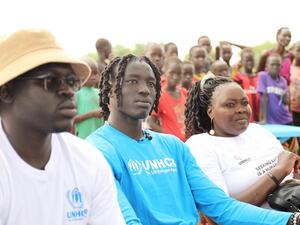UNHCR finds major protection gaps in newly accessible areas of Nigeria
UNHCR finds major protection gaps in newly accessible areas of Nigeria
Most civilians living in areas of northern Nigeria recaptured by the armed forces from Boko Haram since the start of the year still face serious protection problems and lack the most basic assistance, with women particularly at risk.
These are the initial findings of UNHCR staff who have been conducting screenings in the past fortnight on needs and vulnerability in newly accessible areas of Borno state.
The UNHCR team and partners have been interviewing community leaders and individuals since the start of last week about their situation in towns like Monguno, Bama, Damboa, Dikwa, Konduga, Mafa, Magumeri and Shani.
They have found similar patterns in these places of a high level of vulnerability among people displaced by Boko Haram, with nearly every family affected by very worrying protection issues, and observed that some of these people live in fear that the insurgency group could attack them again.
In Monguno, more than 60,000 displaced people, mostly originating from the Marte local government area, are living in nine sites, where they urgently need regular supplies of aid. More people continue to arrive as a result of military operations still taking place in the northern part of Borno state to dislodge Boko Haram, but food shortages are a major concern in sites in Monguno like Kuya, where some 7,500 people are living in dilapidated school buildings and makeshift shelters.
Women in Kuya site have to send their children – sometimes as young as five years – to sell small items or beg in the streets of the town, which was recaptured last February, for money to buy food and medicine. Others send children to collect firewood for sale, putting daughters at risk of assault.
The authorities and some aid agencies have distributed food but on an irregular basis and it is vital that distributions be stepped up and made more regular. UNHCR is working with the government to find a new site for displaced people. UNHCR now plans to deliver much-needed assistance of relief items including mattresses, mats, solar lanterns, cooking supplies, mosquito nets, jerry cans, slippers, female hygiene materials, soap and detergent, to the most vulnerable families in Monguno.
The UNHCR team also found that many families were headed by women because their husbands had been killed by Boko Haram, forced to join the insurgents or disappeared. Many women and children remain traumatized by their time under Boko Haram rule, including the massacre of 50 men rounded up in one village in Marte local government area four months ago. They and their children need counselling and livelihoods support to prevent them resorting to negative coping mechanisms.
Our teams noticed a lot of breastfeeding women, including teenagers, as well many young girls with children. The launch of livelihood projects is urgently needed to help women become self-sufficient and lessen the risk of people turning to survival sex.
We also saw several children in Monguno suffering from severe acute malnutrition. Even though several agencies are providing life-saving treatment, malnutrition remains rampant in Monguno and other newly accessible areas.
Shelter is another major protection need for most of the displaced populations. The UNHCR visited the Central Primary School, which hosts some 1,300 people; some were staying in buildings with crumbling roofs. The authorities have asked UNHCR and other aid agencies to help them develop a new site in Monguno to host the people presently accommodated in school buildings.
They are unlikely to return to their home villages soon because of continuing insecurity, disrupted economic activity and the presence of land mines in their villages and fields.
Security continues to restrict our movements in parts of Borno, but we hope to continue our vulnerability screening visits to sites in Banki, Dikwa and Gamboru-N’Gala in the next few weeks. These visits allow us to assess needs and address gaps to better assist the internally displaced populations, especially in the areas of security, shelter, psycho-social support, and livelihood activities, as well as avoid duplication of tasks with other agencies.
More than 2 million people have been forcibly displaced in Nigeria, including 1.87 million who fled Boko Haram violence since 2014. Some 195,350 people have sought shelter in neighbouring Cameroon, Chad and Niger.
For more information on this topic, please contact:
- In Dakar (currently on mission in Nigeria): Hélène Caux, [email protected], +234 809 016 1446 and + 221 77 333 1291
- In Nigeria, Hanson Ghandi Tamfu, [email protected], +234 80 57 98 19 73
- In Geneva, Nora Sturm, [email protected], +41 79 200 76 18








